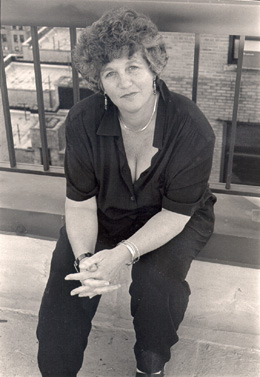1940 - Today
By: Tanya Visceglia | Date Added:

When I was twenty-one, the last person in the world I wanted to be was myself. Gay and lesbian members of my Italian Catholic family were hushed up when visitors came and pitied when we were alone. If neighbors asked about my love life, they heard: “Tanya’s too busy at work to look for a husband. Do you know anyone who might like her?” My cousin, whose partner of twenty-five years loved her fiercely, even as cancer wasted her frame to dry twigs, was always called “Poor Fran”. “She never really had a family. But at least she had that friend to keep her company”. One day, browsing in Judith’s Room, which has since gone the way of most independent booksellers, I picked up a collection of essays called “A Restricted Country” by a writer named Joan Nestle. The book jacket described her as a “1950s femme from the Bronx”. Intrigued, I opened to the essay, “Butch-Femme Relationships: Sexual Courage in the 1950s”, and read: “Although I have been a lesbian for over twenty years and embrace feminism as a worldview, I can spot a butch thirty feet away and still feel the thrill of her power.” And “Butch-femme relationships, as I experienced them, were complex erotic statements, not phony heterosexual replicas. They were filled with deeply lesbian language of stance, dress, gesture, love, courage, and autonomy.” I started to cry right there in the aisle. Why had I never heard this before? Finally, I could see myself, and for the first time, had permission to be myself. I cradled that book all the way home. The same copy I bought that day has accompanied me on my journey across three continents and thirty years. The following year, when Joan taught the first course in Gay and Lesbian Literature ever offered at Queens College, I had read every book on the syllabus before the first class. Similar courses today usually have a more specific focus, with titles such as “What is Queer? The Politics and Practices of Self Fashioning.” But back then, we were just hungry: for testaments to our own experience and for a place in which we could occupy the center of discourse without being accused of “throwing our sexuality in people’s faces” or “making an issue” where none need exist. We read everything from Walt Whitman’s “Calamus” poems to James Baldwin’s “Giovanni’s Room”, to Audre Lorde’s “Zami” to Leslie Feinberg’s “Letter to a Fifties Femme”. From the first class, Joan’s kind blue eyes and genuine interest in every one of us slowly drew us out and made room to unfold our experience — from humor to desire to despair. One day, my friend Frank acted out a traffic stop scene from the iconic “Mr. Benson” series of gay erotica, squaring off in his police academy uniform and mirrored sunglasses. His performance met with wolf whistles of approval from students and Joan’s dry response: “Now I see why you want to be a police officer so much.” In another class, we read our own poetry aloud. A soft-spoken student who rarely participated in class discussions shared a poem that she had written to a woman with severe burns, a stranger she saw every day on her way to work. “With strips of skin like loose bandages/I want to ask how you can be so brave/ wearing your scars on the outside/when I live with so much fear/wearing my scars on the inside.” I chose to read a piece about a friend who had recently died of AIDS. My tears were both fed and soothed by classmates’ slow nods of recognition and thick, respectful silence. I knew, without needing to ask, that over the past ten years, every other student in that room had also been crossing friends’ numbers out of their phone books — one by one. At the end of the semester, Joan invited us to her apartment for a potluck. We entered to find our history displayed on every wall, bookshelf, and end table; at that time, her apartment still housed the huge collection of letters, papers, and periodicals that made up the Lesbian Herstory Archives. Balancing plates on our laps, we clustered around Joan, asking her to read from her own work. I requested the essay I had first read in Judith’s Room. She began: “The erotic essence of the butch-femme relationship was the external difference of women’s textures and the bond of knowledgeable caring. I loved my lover for how she stood as well as what she did. … these gestures were a style of self-presentation that made erotic competence into a political statement.” Hearing those words in Joan’s own voice, surrounded by my queer classmates and the lovingly catalogued proof of our collective existence and persistence, I knew I had come home. Joan’s gift to us – the gift of shared history and purpose, remains with me and continues to sustain me in a world that has changed radically in some ways, but in others not at all. It gives me the strength to speak up for my partner in the thousandth performance of the tired old routine: “Excuse me, Sir. This is the ladies’ room. It deflects the pain of my mother’s hissed whisper: “Why do you have to go around telling people you’re married? It’s none of anybody’s business.” They may not know who I am, but now I do. And that is enough. Note: A longer version of this story was published in the Autumn 2021 issue of “monologging”. https://monologging.org/for-joan-nestle-writer-mentor-friend/
click hereShare your thoughts on this story with us. Your comments will not be made public.
Email
Copyright ©2016 - Design By Bureau Blank